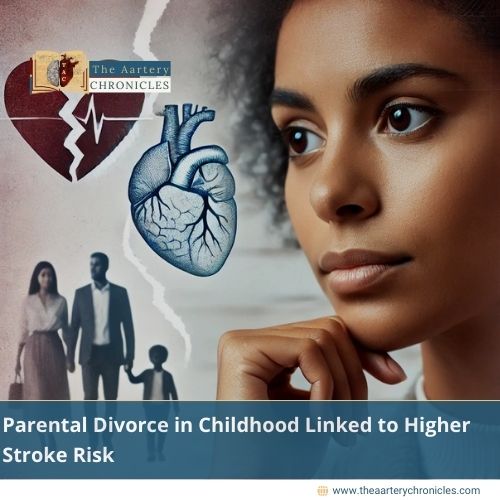

Parental Divorce in Childhood Linked to Higher Stroke Risk, Study Finds
Did you know that experiencing your parents’ divorce during childhood might increase your risk of having a stroke later in life? A groundbreaking study published in the open-access journal PLOS One by Esme Fuller-Thomson from the University of Toronto, Canada, and her research team reveals this surprising connection.
Stroke: A Growing Health Concern
Every year, around 795,000 people in the United States suffer from a stroke. The factors like high blood pressure, smoking, and poor diet are well-known contributors, this new research highlights how early life experiences, such as parental separation, might also play a significant role.
The Science Behind the Study
The researchers analyzed extensive data to uncover how childhood stressors impact long-term health. They discovered that individuals whose parents divorced during their formative years had a higher likelihood of experiencing a stroke in adulthood. This finding adds to a growing body of evidence suggesting that adverse childhood experiences (ACEs) can have lasting effects on physical health.
Why Does Parental Divorce Affect Stroke Risk?
The link between parental divorce and stroke risk may be due to several factors:
- Chronic Stress: Early exposure to family disruption can lead to prolonged stress, which negatively affects cardiovascular health.
- Mental Health Struggles: Children of divorced parents may face
- Anxiety
- Depression
- Increases the risk of unhealthy behaviours like smoking or poor eating habits.
- Socioeconomic Changes: Divorce often leads to financial strain, which can limit access to quality healthcare and nutritious food.
Senior author Esme Fuller-Thomson adds: “It is extremely concerning that older adults who grew up in divorced families had 60% higher odds of stroke, even after excluding those who had been physically or sexually abused as children. The magnitude of the association between parental divorce and stroke was comparable to well-established risk factors for stroke such as male gender and having diabetes.”
What Can Be Done to Reduce the Risk?
While we can’t change the past, understanding these risks can help in prevention. Here are some proactive steps:
- Manage Stress Effectively: Techniques like mindfulness, therapy, and regular physical activity can reduce stress levels.
- Prioritize Mental Health: Seeking support for anxiety or depression can improve both mental and physical well-being.
- Adopt a Healthy Lifestyle: A balanced diet, regular exercise, and avoiding smoking can significantly lower stroke risk.
The Bigger Picture: How Early Life Shapes Adult Health
This study emphasizes the importance of early life experiences on long-term health. It encourages healthcare providers to consider childhood history when assessing stroke risk. More importantly, it highlights the need for supportive environments and interventions for children going through parental separation.
Conclusion
Parental divorce is a challenging experience, and awareness of its potential health impacts can empower individuals to take preventive measures. By focusing on mental health, stress management, and healthy lifestyle choices, we can reduce the risks and promote better health outcomes for everyone.
Source: Inputs from various media Sources

Dane
I am an MBBS graduate and a dedicated medical writer with a strong passion for deep research and psychology. I enjoy breaking down complex medical topics into engaging, easy-to-understand content, aiming to educate and inspire readers by exploring the fascinating connection between health, science, and the human mind.








